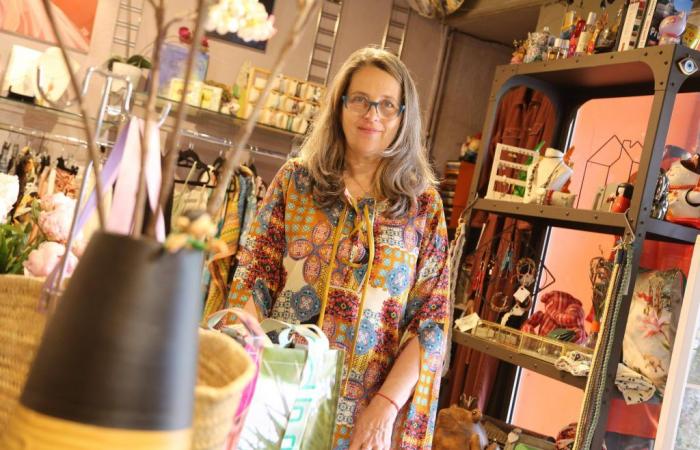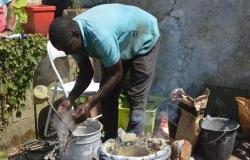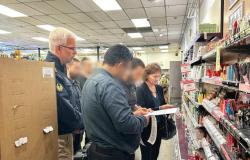
On the windows of their shop or restaurant, at the entrance to their farm, a small sticker announces it, they are committed. The “committed businesses” label, issued by the Ecoscience Provence association, has flourished among traders in Green Provence since 2016 and more recently in the Heart of the Var. Extended to producers and restaurateurs, it displays their commitment to the environment.
Three main principles must be respected: sorting and recycling waste – this is the first commitment – managing water and electricity consumption and raising customer awareness. Retailers can also promote short circuits to support the local economy. Second-hand equipment or recycling for decoration, for example, are welcome.
“Every year, we take stock with our participants and together we determine the areas for improvement.explains Stéphanie Rousseau, project manager within the association. Everyone moves forward at their own pace.”
Many candidates for the label are already well advanced on the path to eco-responsibility.
Ideas and common sense
For Judith, Pierre and Aurélie, Magali, Pauline, Nadine, Hugo and Johan it is “intrinsic”in their “ADN”.
Sorting waste, limiting packaging, that’s the basis. And raising awareness among their customers is more like exchanging advice than providing information. On eco-responsibility, they are inexhaustible and want “show what is possible” with finally “A little common sense”.
“The label pushes us to improve”
Like in Nadine Bartekci’s little grocery store in Pignans.
In My Bioteck grocery store, bulk cereal dispensers are recyclable in the composter, returnable bottles, local products are promoted. The circuit is perfectly virtuous right down to the cap. When the grocer receives the label in 2023, it is one of the first in Cœur du Var. “It validated everything I had put in place. It corresponds to what I want to convey.”
For Magali Zelli, manager of Shark and Co in Saint-Maximinthere is also a story of transmission. In his shop, labeled in 2018, a large place is given to second-hand clothes to write a “new story and the rest is artisanal and ethical”.
Giving a second life to fabric is also Pauline Bourdin’s credo in her Atelier d’Isaaline. “The label pushes us to improve”.
Being part of the network also means exchanging with other label holders, providing feedback and passing on information. “We are a neutral interlocutor between professionals and communities”says Stéphanie Rousseau. Because the goal is still to move the lines, to find solutions.
A recognition that Ecoscience is also spreading in Bouches-du-Rhône and Monaco, and on the markets.
“You have to try to see what is possible”
They participated for six months in the “Zero Waste Family” operation with Sived. Needless to say, sorting no longer holds any secrets for them.
Committed to an ecological approach since their installation in 2019 in Entrecasteaux, they were labeled Committed Producer the following year.
“Giving meaning to our lives”
For Pierre and Aurélie, eco-responsibility was obvious. “We control our livestock. We have chosen human-scale beekeeping to be able to reduce our impact on energy, particularly for transport during transhumance, which we want to be local. And also to give meaning to our lives.”
To go even further, Pierre and Aurélie consign their pots, like five beekeepers from Provence verte. The idea is to collect them, wash them and put them back into service.The Saint-Maximin Leap would make its washing plant available. Luckily, honey is easily washable. But you will have to find time and a solution to store the clean jars.
Since February, they have been testing the washable labels provided by Ecoscience “with complex constraints. It is still experimental but we must try to see what is possible to do.”
Markets also begin their “eco-management”
In markets too, the question arises of how to limit waste. In 2015, the Garéoult market and the Ecoscience Provence association launched the operation “Eco-management of the fairground market”.
14% drop in waste
Objective: the collection and recovery of wood and cardboard waste; the limitation of single-use bags and the fight against waste.
Nearly ten years later, the results are there. The association has noted a 14% drop in waste.
The program also planned to promote local products. Labeling now indicates the origin of the products: green for producers; orange for the resale of local products and purple for non-local products.
Four other markets under study
The Garéoult market led the way. Last year, Ecoscience Provence visited the markets of Cotignac, Le Val, Nans-les-Pins and Rocbaron to conduct a field survey to learn about the practices of the fairground workers and to make a projection of the measures to be implemented.
According to the association, a third of those surveyed – 138 fairground workers – are in favour of sorting. The majority of producers reuse their wooden crates and manage biowaste (compost).
But 72% of fairground workers use disposable bags. Finally, most of them are in favor of color labeling for the origin of products.
“It is a matter of common sense”
Judith Ricard, committed from the very beginning, always has a thousand ideas in mind to fully live her conviction. At each visit of Ecoscience, in her Ferme de la Prétuilière in La Celle, “Finding areas for improvement is a challenge. But there is always room for improvement.”
Between her production of organic fruits and vegetables, a composter available to her customers – she is the one who inspired the collective composters in the villages -, the solar panels which power the fence of her chicken coop, she ticks all the boxes of the specifications to obtain the label. “As I am over-consuming energy, I bought a second-hand electric car even if it is not yet ideal for me.”
In addition, no single-use bags have ever set foot on his farm. His customers never come empty-handed. Baskets arrive empty and leave full. “It is a matter of common sense.”
His farm, a place to live and meet
“When I settled in, I wanted to see what was possible on a small area, one hectare suited me.”
With all the signs in the green, his farm was naturally labeled in 2017.
A label she already knew when she joined a producers’ group in 2016. “The idea was to bring together products from different farms in one place to save people time.” But forced to slow down, she now works with just one market gardener in Val and “we share deliveries.”
On his farm, we come across dogs to scare away foxes and wild boars, chickens, ducks, a pony and a cat.
“I wanted my farm to be a place of life and meeting. The Repair Café used to be held here”For now, she plans to redevelop her processing workshop and her micro-soap factory this year.
A point for improvement anyway? “Maybe there is a lack of local currency…”
The new labeled ones who think big
Their blue food truck Hug & Jo can be seen from afar in the Nicopolis area of Brignoles. Hugo Truchot and Johan Munoz are the new label holders to affix the famous distinction to their restaurant. They are 28 years old and did not wait, fresh out of school, to have big projects.
“A real customer demand”
On the marketing side, they want to do things their way. “The circular economy is in our DNA.”
In the kitchen, they have focused on “the beautiful products of local artisans. We go and get the bread every morning from the Messerlin bakery in Flassans and the meat comes from the Sébiane butcher’s shop in Brignoles. There is a real demand from customers.”
And they have to keep up the pace. They serve between 40 and 70 meals a day. “I learned with my father and my stepmother who are part of it.” Homemade is what makes them strong, the little extra that has made them successful for three years now.
And things don’t stop there.
Food waste goes into compost, packaging is reduced to a bare minimum. “We make our own sauces for quality but also to reduce small packaging.”
Although that “the diagnosis made with Ecoscience Provence was already pretty good”The label, obtained in May, comes “validate the approach and certify a working method. It’s a real plus. We also want to accelerate the change of vision on the food truck.”
And this is just the beginning. Soon, it will be on Place Carami that the two childhood friends will take up their quarters, fixed this one. “We already have our team, our childhood friend is joining us.”
Another label in perspective.
In numbers
The network of professionals involved in Green Provence includes
– 58 shops.
– 25 restaurateurs.
– 33 producers.
In the Heart of Var, 16 businesses have obtained the label.
– 42% of customers have their own bag.
– 64% of businesses use eco-labeled cleaning products.
– 85% of restaurateurs compost or recycle their waste.
– 94% of producers promote biodiversity.





